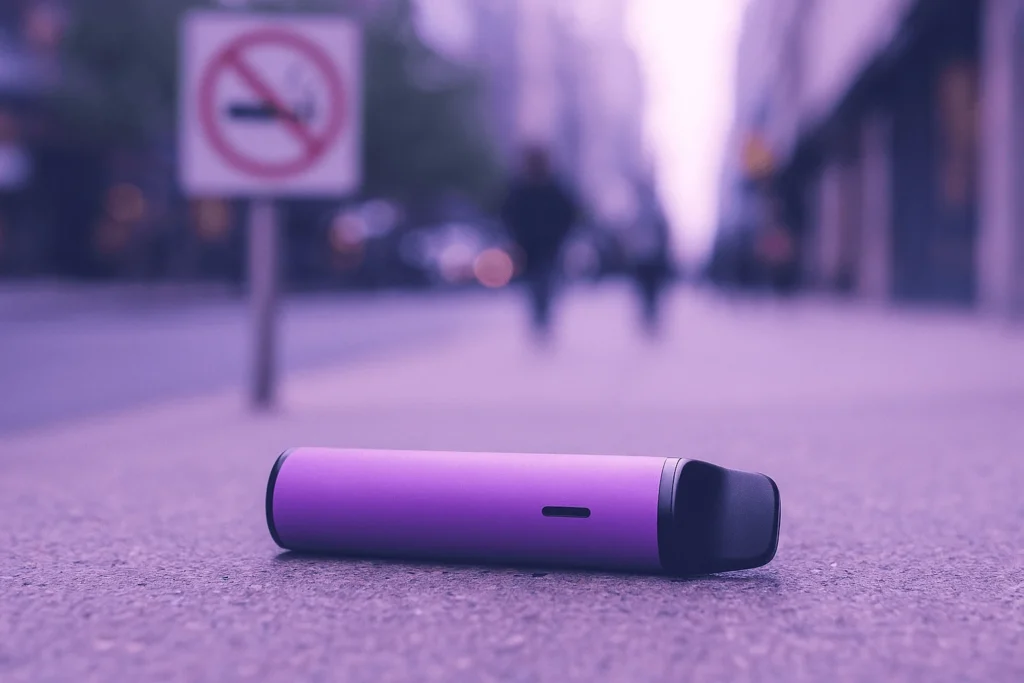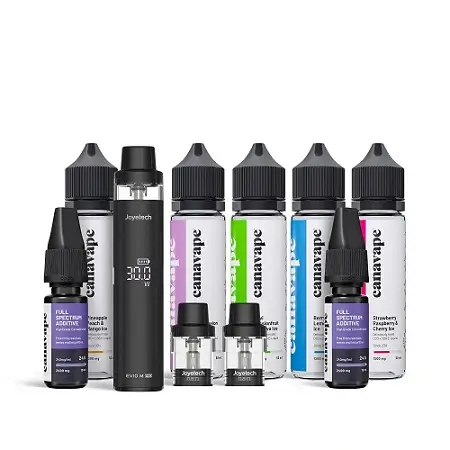
As environmental concerns continue to rise, the ban on disposable vapes is gaining momentum across the UK.
Even though this news has been available for sometime, lots of people are still wondering, why are they banning disposable vapes?
These single-use devices, while popular for their convenience, have become a significant source of waste and pollution.
Authorities are stepping up to address the litter problem caused by discarded vapes, which often end up in landfills or, worse, as litter on our streets and in our waterways.
This move reflects a broader shift towards sustainability and responsible consumption in society.
In this post, we will delve into the reasons behind the ban, its implications for consumers and the environment, and what alternatives might be available for vape users.
The ban on disposable vapes in the UK is a significant move that aims to tackle the environmental and health issues linked with these products.
This section delves into the primary reasons for the ban, its potential impact on public health, and the environmental concerns driving this initiative.
Disposable vapes including cbd vape disposables have become a target due to their environmental and health impacts. The ease of disposal means these devices often end up as litter, contributing to pollution.
Additionally, they contain non-biodegradable materials such as plastic and lithium-ion batteries, which pose hazards when not properly disposed of.
Authorities have initiated the ban to encourage responsible consumption and reduce waste. By targeting single-use items, the hope is to lessen the overall environmental footprint.
Furthermore, concerns about the accessibility of these vapes to young people have added pressure on regulators to act.
The ban reflects a broader movement towards sustainable practices and responsible product use.
It aims to promote a shift in consumer behaviour, encouraging a transition from disposables to more eco-friendly alternatives.

The ban’s impact on public health is multifaceted. Vapes are often marketed as a safer alternative to smoking, yet their long-term health effects remain uncertain.
This ban could prompt users to reassess their consumption habits, possibly reducing dependency on nicotine, pushing consumers to seek alternatives to nicotine for various reasons such as anxiety.
Public health advocates argue that discouraging disposable vapes could reduce exposure to potentially harmful substances.
The ban may also deter younger individuals from starting to vape, aligning with public health goals of reducing nicotine addiction among youths.
However, there’s concern that the ban could push some users back to traditional smoking.
Authorities are working to ensure that the ban is accompanied by support systems to help users transition away from nicotine dependency in healthier ways.
Environmental factors are a significant driver behind the ban. Disposable vapes contribute to both plastic waste and electronic waste.
These products are not typically recycled properly, leading to an accumulation of non-biodegradable materials in landfills.
The environmental impact is exacerbated by the presence of hazardous substances like lithium batteries, which can leach into soil and water systems if not disposed of correctly.
This poses a risk to ecosystems and human health.
By banning disposable vapes, authorities aim to reduce these environmental impacts.
The move encourages manufacturers and consumers to consider the lifecycle of products and strive for more sustainable, recyclable options.
With the ban on disposable vapes, users might wonder about their alternatives. This section explores reusable vape options and nicotine replacement therapies as viable solutions for those affected by the ban.
Reusable vapes are emerging as the primary alternative to disposables. They offer a more sustainable option, as they are designed for long-term use. Users can refill them with e-liquid, reducing waste.
Reusable vapes typically have a higher initial cost but are more economical over time. They require maintenance, such as cleaning and coil replacement, which can be a barrier for some users.
However, the environmental benefits are significant as they minimise waste compared to disposables.
Additionally, reusable vapes often come with advanced features like adjustable power settings and better battery life, providing a more customisable experience.
This could appeal to users seeking a more personalized vaping experience.
At Canavape we offer a wide rage of alternatives to disposable CBD vapes including CBD vape starter kits which offer you all you need to get started with our CBD vape juice and CBD e liquid ranges.

For those seeking to quit nicotine altogether, nicotine replacement therapies (NRTs) provide an effective alternative.
NRTs include products like nicotine patches, gum, and lozenges, which help manage withdrawal symptoms.
NRTs are designed to gradually reduce nicotine dependency. They provide controlled doses of nicotine without harmful substances found in cigarettes and some vaping products.
This makes them a safer alternative for individuals aiming to quit smoking.
The availability of NRTs through healthcare systems also ensures accessibility.
They are often recommended by medical professionals as part of comprehensive quit smoking programmes, offering support and guidance for individuals on their cessation journey.
Implementing the ban involves navigating legal landscapes and ensuring compliance. This section discusses the regulations surrounding the ban and the consequences of non-compliance.
Regulations around the ban require manufacturers, retailers, and users to comply with new laws.
The government has introduced stringent rules to phase out disposable vapes, focusing on prohibiting their sale and distribution.
Compliance involves understanding the specific legal requirements and adjusting business practices accordingly. Retailers, for instance, must remove these products from their shelves and inform customers about the change.
Authorities are setting up systems to monitor compliance and provide guidance to affected parties.
Ensuring that all stakeholders are aware of their responsibilities is crucial for the smooth implementation of the ban.
To enforce the ban effectively, penalties for non-compliance have been established. These penalties serve as a deterrent and encourage adherence to the new regulations.
Non-compliance can result in fines or other legal actions against businesses and individuals who continue to sell or distribute disposable vapes.
This underscores the seriousness of the ban and the commitment to reducing environmental and health impacts.
Authorities may also implement spot checks and inspections to ensure compliance.
By maintaining a rigorous enforcement strategy, the effectiveness of the ban can be maximised, fostering a shift towards more sustainable vaping practices.
The public’s reaction to the ban is varied, with differing perspectives among consumers and industry players. This section explores how these groups are responding and adapting to the changes.
Consumers have mixed feelings about the ban on disposable vapes.
Some welcome the move as a necessary step towards environmental responsibility, while others are concerned about losing a convenient product.
For those who support the ban, it represents a positive shift towards sustainability and reduced waste. They view it as an opportunity to explore more eco-friendly options and reduce their environmental impact.
Conversely, some users feel inconvenienced, particularly those who value the ease and accessibility of disposables. They may be reluctant to switch to reusable devices or explore other nicotine alternatives.
The vape industry is adjusting to the ban by innovating and diversifying its product offerings. Manufacturers are focusing on developing sustainable products that comply with the new regulations.
Many companies are investing in research to create reusable devices and eco-friendly e-liquids. This shift requires adapting production processes and marketing strategies to align with sustainability goals.
Additionally, the industry is engaging with policymakers to understand the regulations better and ensure compliance.
By adapting to the new landscape, companies aim to remain competitive while contributing positively to environmental efforts.
Looking ahead, the vaping industry faces new challenges and opportunities in the wake of the ban.
This section considers the future of vaping in terms of innovation and sustainability, and predicts upcoming trends.
Innovation is key to the future of the vaping industry. Companies are investing in sustainable technologies to create better products.
This includes developing biodegradable components and more efficient recycling systems.
Sustainability efforts are also being prioritised in the production and distribution processes. By focusing on reducing carbon footprints and waste, the industry can align with broader environmental goals.
Moreover, innovation is not limited to products. It extends to business models, with companies exploring subscription services and take-back programmes to encourage recycling and responsible consumption.
Looking forward, several trends are expected to shape the vaping industry. Increased regulation will likely drive further innovation, as companies adapt to meet new standards.
One trend is the growing popularity of reusable devices. As consumers become more environmentally conscious, demand for sustainable products will rise.
This could lead to the development of more user-friendly and cost-effective reusable vapes.
Additionally, the integration of technology, such as app-controlled devices and personalised vaping experiences, will continue to evolve.
These trends reflect the industry’s commitment to innovation and sustainability in a changing regulatory environment.
We hope this article helps explain why are they banning disposable vapes.
Buy CBD vape & a range of refillable options for CBD vaping here or contact us for more information on our product ranges.